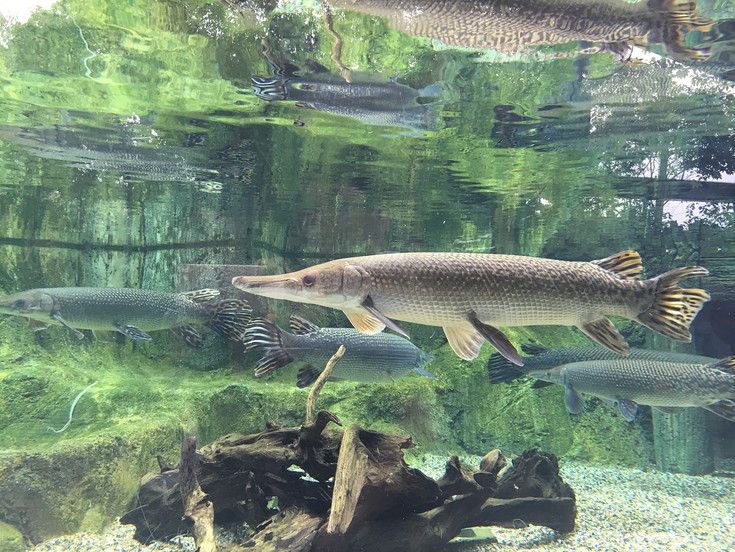13.07.2023 - The Importance of Landscapes for Riverine Fish

(c) pixabay
A global team of researchers led by the University of Natural Resources and Life Sciences, Vienna (BOKU) and Michigan State University (MSU) has conducted a comprehensive analysis of the impact of human activities on fluvial fishes in the United States and Europe. The study, which examined over 30,000 fish sampling sites across the two continents revealed significant negative effects on fish populations due to landscape stressors, with urbanization and intensive agriculture being the most prominent ones.
Riverine ecosystems are shaped by the landscapes they traverse. Rivers encompass diverse habitats for aquatic organisms, especially freshwater fish and thus play a crucial role in supporting biodiversity, contributing to environmental health, economic prosperity, and human wellbeing. However, in recent decades, riverine ecosystems have experienced a significant decline in biodiversity, leading to a global crisis for river fishes.
Agricultural land use and urbanization, especially, can lead to habitat degradation and fragmentation, altered hydrology and thermal regimes, migration barriers, and water quality issues in streams and rivers around the globe. These drivers pose a significant threat to fish assemblages, as their decline can be attributed to a range of human-induced stressors, also jeopardizing numerous ecosystem services and thus human welfare and wellbeing.
The research, led by Rafaela Schinegger, assistant professor for nature conservation planning at BOKU, in collaboration with Maria Magdalena Üblacker (BOKU alumni and current PhD student at Leibniz Institute of Freshwater Ecology and Inland Fisheries, Berlin, Germany) and Dana Infante, Professor in the Department of Fisheries and Wildlife at MSU, focused on quantifying the impact of human landscape stressors across two continents. Within an international research team, they evaluated two key determinants: stressor frequency, which measures the prevalence of landscape stressors causing negative responses in fish assemblages, and stressor severity, which assesses the intensity of the negative response caused by specific human stressors. Their study showed that fish species intolerant to habitat degradation in general, including water quality impairments and hydro-morphological changes (channel alteration, barriers, spawning habitat loss) are the most responsive and sensitive traits over a wide range of ecoregions and across continents.
Through the documentation of hundreds of such fish responses to multi-scale stressors, this study provides rich findings to aid in understanding and comparing threats to fishes across large geographic areas. The authors also address “uncertainties & limitations” and “future directions & management implications” in their article, highlighting data gaps, required management practices and future research needs, which is important information for decision-and policy makers. With this, the study supports efforts to protect and restore freshwater biodiversity and conserve river fishes worldwide.
Rafaela Schinegger, the corresponding author of the study emphasizes that the study also provides further evidence about the necessity to analyze interconnections between aquatic and terrestrial ecosystems and their implications for future nature conservation planning. In her opinion, the study's outcomes can also provide relevant information for the implementation of various EU Directives and especially the EU Biodiversity Strategy for 2030.
Link to publication in STOTEN (Science of the Total Environment):
Üblacker, M. M., Infante, D. M., Cooper, A. R., Daniel, W. M., Schmutz, S., & Schinegger, R. (2023). Cross-continental evaluation of landscape-scale drivers and their impacts to fluvial fishes: Understanding frequency and severity to improve fish conservation in Europe and the United States. Science of The Total Environment, 165101.
https://doi.org/10.1016/j.scitotenv.2023.165101
For further information, please contact:
Rafaela Schinegger
Institute for Landscape Development, Recreation and Nature Conservation Planning (ILEN)
University of Natural Resources and Life Sciences, Vienna (BOKU)
Email: rafaela.schinegger@boku.ac.at
Maria Magdalena Üblacker
Research group Global Freshwater Biodiversity, Biogeography and Conservation
Leibniz Institute of Freshwater Ecology and Inland Fisheries
Email: maria.ueblacker@igb-berlin.de
Dana Marie Infante
Department of Fisheries and Wildlife
Michigan State University (MSU)
Email: infanted@msu.edu
